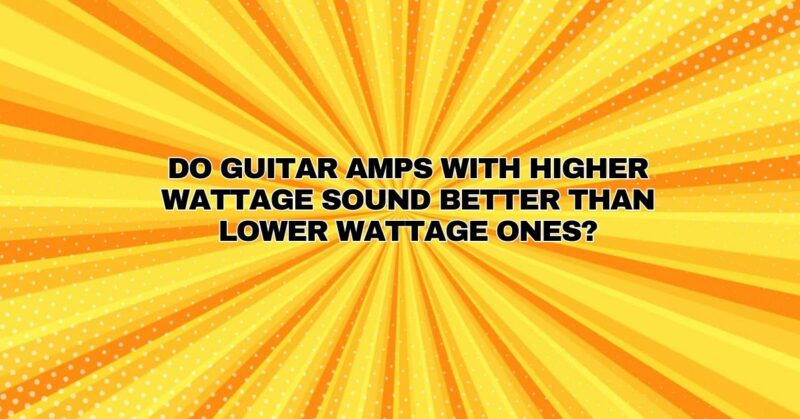The world of guitar amplification is filled with options, and one of the most debated aspects is whether guitar amps with higher wattage sound better than their lower wattage counterparts. This debate often stems from misconceptions about wattage and its direct influence on tone. In this article, we’ll dive into the complex relationship between guitar amp wattage and tone, helping you understand that higher wattage doesn’t necessarily equate to better sound.
The Wattage-Tone Connection:
First and foremost, it’s essential to debunk the myth that higher wattage amps inherently sound better. The tone of an amplifier is the result of a complex interplay of various components and factors, with wattage being just one of them. Here’s why higher wattage doesn’t guarantee superior sound:
1. Clean Headroom:
Higher wattage amps often provide more clean headroom, meaning they can produce louder, undistorted tones at higher volumes. While this can be beneficial for specific genres like jazz or country, it doesn’t necessarily translate to “better” sound. In fact, some guitarists prefer the natural compression and harmonically rich overdrive that lower wattage amps offer when pushed to their limits.
2. Speaker Size and Configuration:
The size and configuration of your amplifier’s speakers play a significant role in determining its tone. Smaller speakers can produce a tighter, focused sound with pronounced midrange, while larger speakers may deliver more bass response and a broader frequency range. The choice of speakers matters more than wattage when it comes to tone shaping.
3. Tube vs. Solid-State:
The type of amplification technology (tube or solid-state) also greatly influences tone. Tube amps are renowned for their warm, harmonically rich sound, while solid-state amps can provide cleaner, more precise tones. Wattage is secondary to the amplifier’s technology when considering tonal characteristics.
4. Speaker Sensitivity:
The sensitivity of your amp’s speakers plays a crucial role in tone. More sensitive speakers can produce higher volume levels with the same wattage, which can impact perceived tonal qualities.
5. Pedals and Effects:
The use of effects pedals and processors can dramatically shape your amp’s tone. The combination of your guitar, pedals, and amp can create a wide range of sounds, regardless of the amp’s wattage.
6. Playing Technique:
Your playing technique, dynamics, and touch on the guitar strings have a profound impact on your tone. Skilled players can coax beautiful tones from lower wattage amps through their expressive playing.
Tonal Preferences:
Ultimately, the concept of “better” tone is highly subjective. Tonal preferences vary widely among guitarists and are influenced by the style of music, playing technique, and individual taste. Some players prefer the raw, organic breakup of a lower wattage amp, while others may favor the pristine clean tones of a high wattage amp. Neither preference is objectively superior; it’s a matter of personal taste and musical context.
Conclusion:
In conclusion, the notion that higher wattage amps inherently sound better is a misconception. Tone is a multifaceted characteristic influenced by various factors, including speaker size, amplifier technology, speaker sensitivity, and your playing style. While higher wattage amps may offer more clean headroom and volume, they don’t universally produce “better” sound. The key to finding your ideal tone lies in understanding how different components and factors interact and experimenting to discover the sonic qualities that resonate with you as a guitarist.


